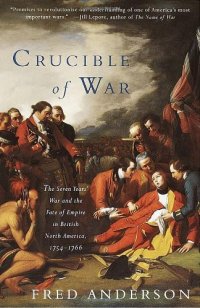
Ebook: Crucible of War: The Seven Years' War and the Fate of Empire in British North America, 1754-1766
Author: Fred Anderson
Amazon.com Review Histories of the American Revolution tend to start in 1763, the end of the Seven Year's War, a worldwide struggle for empire that pitted France against England in North America, Europe, and Asia. Fred Anderson, who teaches history at the University of Colorado, takes the story back a decade and explains the significance of the conflict in American history. Demonstrating that independence was not inevitable or even at first desired by the colonists, he shows how removal of the threat from France was essential before Americans could develop their own concepts of democratic government and defy their imperial British protectors. Of great interest is the importance of Native Americans in the conflict. Both the French and English had Indian allies; France's defeat ended a diplomatic system in which Indian nations, especially the 300-year-old Iroquois League, held the balance between the colonial powers. In a fast-paced narrative, Anderson moves with confidence and ease from the forests of Ohio and battlefields along the St. Lawrence to London's House of Commons and the palaces of Europe. He makes complex economic, social, and diplomatic patterns accessible and easy to understand. Using a vast body of research, he takes the time to paint the players as living personalities, from George III and George Washington to a host of supporting characters. The book's usefulness and clarity are enhanced by a hundred landscapes, portraits, maps, and charts taken from contemporary sources. *Crucible of War* is political and military history at its best; it never flags and is a pleasure to read. *--John Stevenson* From Publishers Weekly From 1756 to 1763, the Ohio Valley was the site of a historic contest between the French and the English, both of whom wanted to add this fertile soil to their colonial holdings. In this elegant new account of the Seven Years' War, University of Colorado historian Anderson demonstrates that the conflict was more than just a peripheral squabble that anticipated the American Revolution. Not only did the war decisively alter relations among the French, the English and the Native American allies of the two powers, who for decades had played the English and French off one another to their own advantage, but just as critical, argues Anderson, the war also changed the character of British imperialism, with the mother country trying to reshape the terms of empire and the colonists' place in it. (It was the British victory of 1763, for example, that led the British to post a permanent, peacetime army in America and to support those troops with new taxes.) Indeed, Anderson shows that familiar events of the mid-1760s, like the Stamp Act and Tea Act crises, are better understood as postwar rather than prewar events: they did not "reflect a movement toward revolution so much as an effort to define the imperial relationship." This volume, then, will be of interest not just to Seven Years' War buffs, but also to those interested in the entire Revolutionary era. Anderson's magisterial study--like his earlier book, A People's Army--is essential reading on an often ignored war. 90 illus. and 9 maps. Copyright 1999 Reed Business Information, Inc.
Download the book Crucible of War: The Seven Years' War and the Fate of Empire in British North America, 1754-1766 for free or read online
Continue reading on any device:

Last viewed books
Related books
{related-news}
Comments (0)